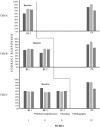Behavioral Skills Training in Portuguese Children With School Failure Problems
- PMID: 29896134
- PMCID: PMC5986943
- DOI: 10.3389/fpsyg.2018.00437
Behavioral Skills Training in Portuguese Children With School Failure Problems
Abstract
This paper postulates that psychology can make an important contribution at an individual level to help children with school failure problems in a context where too little applied research has been conducted on the instructional needs of these children. Some data are analyzed, revealing that, despite some progress, school failure is still a main educational problem in many countries. In this study, Behavioral Skills Training (BST) was applied in Portugal to train children with school failure difficulties. BST is a method based on Applied Behavior Analysis, a teaching package consisting of a combination of behavioral techniques: instructions, modeling, rehearsal, and feedback. Two empirical studies are presented. Their main purpose was to develop behavioral diagnostic and training techniques to teach lacking skills. School success was defined in terms of a set of skills proposed by teachers and school failure as a lack of one or more of these skills. The main instrument was a package of training programs to be applied in three areas: basic behavior (precurrents), academic behavior, or social behavior. The second instrument is a package of check-lists, aimed to determine the level of performance of the child in an area. This check-list was applied before (pre-test) and after (post-test) training. In the first study, 16, 7- to 8-year old children were trained. They were attending the second or third grades and having academic difficulties of different origins. The effects of the training programs are evaluated in terms of percentage of attained objectives, comparing a pre- and a post-test. The results showed an increase in correct responses after training in all cases. To provide a sounder demonstration of the efficacy of the training programs, a second study was carried out using a quasi-experimental design. A multiple baseline design was applied to three 10- to 11-year-old children, referred by teachers because of learning difficulties in the fourth grade. Results showed few performance changes without training. Increases in behavior following BST were evident in all cases, indicating that training generated improvement in all three children. In both studies, comparable results occurred across students, demonstrating replication of the effects of the training programs.
Keywords: academic behavior; applied behavior analysis; behavioral skills training; educational psychology; school failure.
Figures

Similar articles
-
The effectiveness of internet-based e-learning on clinician behavior and patient outcomes: a systematic review protocol.JBI Database System Rev Implement Rep. 2015 Jan;13(1):52-64. doi: 10.11124/jbisrir-2015-1919. JBI Database System Rev Implement Rep. 2015. PMID: 26447007
-
Out-of-school settings as a developmental context for children and youth.Adv Child Dev Behav. 2005;33:43-77. doi: 10.1016/s0065-2407(05)80004-7. Adv Child Dev Behav. 2005. PMID: 16101114
-
[A proposal for reforming psychologists' training in France and in the European Union].Encephale. 2009 Feb;35(1):18-24. doi: 10.1016/j.encep.2007.11.008. Epub 2008 Apr 2. Encephale. 2009. PMID: 19250989 French.
-
[Children with high potential and difficulties: Contributions of clinical research].Encephale. 2018 Nov;44(5):446-456. doi: 10.1016/j.encep.2018.07.006. Epub 2018 Oct 16. Encephale. 2018. PMID: 30340779 Review. French.
-
[Social skills training groups for children and adolescents with Asperger syndrome: A review].Arch Pediatr. 2011 May;18(5):589-96. doi: 10.1016/j.arcped.2011.02.019. Epub 2011 Apr 1. Arch Pediatr. 2011. PMID: 21458972 Review. French.
References
-
- Adelman H. S., Taylor L. (1993). Learning Problems and Learning Disabilities: Moving Forward. Pacific Grove, CA: Brooks/Cole Publishing Company.
-
- Ayllon T., Azrin N. H. (1968). The Token Economy: A Motivational System for Therapy and Rehabilitation. Englewood Cliffs, NJ: Prentice Hall.
-
- Barnes C. S., Dunning J. L., Rehfedlt R. A. (2011). An evaluation of strategies for training staff to implement the picture exchange communication system. Res. Autism Spectr. Disord. 5 1574–1583. 10.1016/j.rasd.2011.03.003 - DOI
LinkOut - more resources
Full Text Sources
Other Literature Sources

